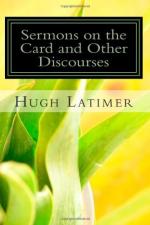to receive it. But I require you in God’s
behalf; leave your wickedness, that ye may receive
it worthily, according to his institution. For
this supper is ordained, as I told you before, for
our sake, to our profits and commodities: for
if we were perfect, we should not need this outward
sacrament; but our Saviour, knowing our weakness and
forgetfulness, ordained this supper to the augmentation
of our faith, and to put us in remembrance of his
benefits. But we will not come: there come
no more at once, but such as give the holy loaves
from house to house; which follow rather the custom
than any thing else. Our Saviour Christ saith
in the gospel of St. John,
Ego sum panis virus,
qui de coelo descendi; “I am the living bread
which came down from heaven.” Therefore
whosoever feedeth of our Saviour Christ, he shall
not perish; death shall not prevail against him:
his soul shall depart out of his body, yet death shall
not get the victory over him; he shall not be damned.
He that cometh to that marriage, to that banquet,
death shall be unto him but an entrance or a door to
everlasting life.
Panis quem ego dabo caro mea
est; “The bread that I will give is my flesh,
which I will give for the life of the world.”
As many as will feed upon him, shall attain to everlasting
life: they shall never die; they shall prevail
against death; death shall not hurt them, because
he hath lost his strength. If we would consider
this, no doubt we would be more desirous to come to
the communion than we be; we would not be so cold;
we would be content to leave our naughty living, and
come to the Lord’s table.
Now ye have heard what shall be the chiefest dish
at this marriage, namely, the body and blood of Christ.
But now there be other dishes, which be sequels or
hangings-on, wherewith the chief dish is powdered:
that is, remission of sins; also the Holy Ghost, which
ruleth and governeth our hearts; also the merits of
Christ, which are made ours. For when we feed
upon this dish worthily, then we shall have remission
of our sins; we shall receive the Holy Ghost.
Moreover, all the merits of Christ are ours; his
fulfilling of the law is ours; and so we be justified
before God, and finally attain to everlasting life.
As many, therefore, as feed worthily of this dish,
shall have all these things with it, and in the end
everlasting life. St. Paul saith, Qui proprio
Filio suo non pepercit, sed pro nobis omnibus tradidit
illum, quomodo non etiam cum illo omnia nobis donabit?
“He which spared not his own Son, but gave
him for us all, how shall he not with him give us all
things also?” Therefore they that be in Christ
are partakers of all his merits and benefits; of everlasting
life, and of all felicity. He that hath Christ
hath all things that are Christ’s. He is
our preservation from damnation; he is our comfort;
he is our help, our remedy. When we feed upon
him, then we shall have remission of our sins:
the same remission of sins is the greatest and most




